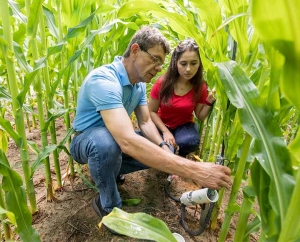UGA Celebrates World Water Day 2019

Water lettuce plants float in cups inside a plant biology grow room.
Water is nearly everywhere, and it’s important.
Whether it is flowing through the College of Engineering’s new 35-foot water tunnel, through Athens’s own Oconee rivers, or being enjoyed and stewarded by the UGA community, it affects our lives. As with the rest of nature, even our understanding of water and the ecological systems it participates is constantly growing.
Today has been designated World Water Day by the United Nations for a host of reasons. It is a finite resource in a world with a growing population, and many people are without access to clean water or reliable irrigation methods; these challenges are serious across the world, including our very own Georgia. This is why it is so exciting to have people like Professor George Vellidis here at the University of Georgia, who is taking a critical look at traditional agricultural irrigation systems in use in the state’s farming industry and developing solutions for smarter water use.

(L-R) Professor George Vellidis and graduate student Anna Orfanou check the circuit board of a UGA Smart Sensor Array node in an experimental crop field on the Tifton campus.
If you’re like me and don’t have a background in agricultural science, there are still plenty of ways you can help, in the Bulldog spirit of taking on these grand challenges together.
- Reducing water usage and water-related waste. Showers over baths, shutting off the tap when you’re brushing your teeth, and using refillable water bottles instead of plastic are all ways you can save water and reduce water-related waste. When you do so at work and home, you’re being frugal for yourself, stewarding the university’s resources well, and leaving more fresh water for later.
- Supporting organizations that are solving water challenges. I’ll let you do your own research on those; there are many worthy organizations out there. As a part of UGA, you should be aware of the Crop Soil Sciences Discretionary Fund, related to Professor Vellidis’s work mentioned earlier, and the College of Environment and Design’s fundraiser for a water bottle refilling station (with only a few days left in its fundraising effort).
Water is a precious resource, and deserves our attention as it affects both our state and many other people across the rest of the world. Pick up a water bottle for use at work, put a sticky note in your bathroom mirror to remember to turn off the sink, or whatever creative way you can think of to make your own drop in the bucket for World Water Day.


